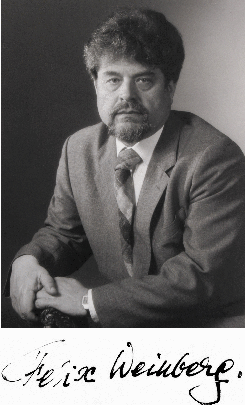Felix Weinberg facts for kids
Quick facts for kids
Felix Jiří Weinberg
|
|
|---|---|
 |
|
| Born | 2 April 1928 Ústí nad Labem, Czechoslovakia
|
| Died | 5 December 2012 (aged 84) |
| Alma mater | University of London |
| Awards | Bernard Lewis Gold Medal (1980), Rumford Medal (1988) |
| Scientific career | |
| Fields | Combustion Physics |
| Institutions | Imperial College London |
| Top - 0-9 A B C D E F G H I J K L M N O P Q R S T U V W X Y Z |
Felix Jiri Weinberg (born April 2, 1928 – died December 5, 2012) was a brilliant Czech-British physicist. He was a top expert in combustion physics, which is the study of how things burn. He worked as a professor and researcher at Imperial College London.
A Life of Learning and Discovery
Early Life and Challenges
Felix Weinberg was born in 1928 in a place called Ústí nad Labem in Czechoslovakia. His teenage years were incredibly difficult. He survived very tough times in concentration camps during World War II.
After the war, he arrived in England. He had not been to a regular school since he was 12 years old. But Felix was determined to learn. He studied hard to earn his first university degrees as an external student from the University of London.
Starting His Science Career
In 1951, Felix joined Imperial College as a research assistant. He earned his PhD in 1954. His PhD work focused on new ways to use light to study the structure of flames. This was a big step in understanding how fire works.
By 1967, he became a full professor of Combustion Physics. This meant he was a leading expert in his field.
Amazing Discoveries in Combustion
Professor Weinberg was famous for his work on flames. He used both light and electricity to study them.
- Seeing Flames Better: He created powerful new ways to use light to see inside flames. This helped scientists understand how flames behave.
- Controlling Flames with Electricity: He also used electricity to study flames. His work showed how electric fields could control how things burn. This helped explain how tiny particles like soot form in flames.
- Cleaner Burning Fuels: Felix developed new burning devices. These devices used special heat exchangers. They could burn fuels that were usually hard to ignite. This led to cleaner furnaces that were better for the environment.
- Better Jet Engines: His research also looked at making powerful flames stable. This work is helping to create jet engines that burn fuel more efficiently.
- Laser Ignition: He also studied how to start fires using lasers. This research helped understand the dangers of using optical fibers near flammable materials.
Sharing Knowledge and Earning Awards
Felix Weinberg shared his knowledge all over the world. He visited universities in Europe, the USA, Japan, and Israel. He also advised many companies in different industries.
He wrote or edited four books and over 220 scientific papers. His many contributions were recognized internationally. He received many important awards, including:
- The Bernard Lewis Gold Medal (1980)
- Being made a Fellow of the Royal Society (1983)
- The Rumford Medal from the Royal Society (1988)
- The Italgas Prize for Energy Sciences (1991)
- The Hugh Edwards Lifetime Achievement Award (2005)
A Voice for Truth
As someone who survived the concentration camps, Felix cared deeply about the truth of what happened during the Holocaust. His own story of his experiences, called 'Boy 30529: A Memoir', was published after he passed away in 2013.
He was one of about 900 children saved by Antonín Kalina. Kalina was a Czech citizen who is honored for his bravery in saving lives during the war.
 | Toni Morrison |
 | Barack Obama |
 | Martin Luther King Jr. |
 | Ralph Bunche |

